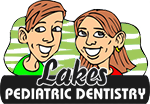If your child is sick, their pediatrician may prescribe medicine to alleviate symptoms or knock out a bacterial infection. There will likely be information available as to possible side effects or interactions with other drugs, but there might not be any information about potential effects of that medication on their dental health. In this article, we take a brief look at the most commonly prescribed medications for children, and how these medications can affect your child’s dental health.
Antibiotics and Dental Health in Children
If your child has a bacterial or fungal infection, they might be feeling miserable, and your pediatrician will likely prescribe an antibiotic. Of the most commonly prescribed pediatric medicines, antibiotics dominate the list. They can be very effective for illnesses such as strep throat, pneumonia and certain sinus and ear infections. Amoxicillin is very often prescribed for babies with ear infections. However, research has found that antibiotics, in particular amoxicillin, may affect tooth enamel. Kids who took amoxicillin were more likely to have fluorosis, a condition where teeth are exposed to an excess of fluoride. This can cause stains or pitting on the teeth. Further information reveals that even if amoxicillin is used as an infant, this high level of fluoride may cause developmental issues in permanent teeth.
Tetracycline is another antibiotic that can adversely affect a child’s teeth, but in this case, there is also a danger if the mother takes this medicine while pregnant. In fact, it is advised that children younger than 8 years of age should not take it at all. If used in early childhood, it may cause the teeth to become stained. If a mother takes it while pregnant, it may even cause permanent discoloration of the child’s teeth. Tetracycline can also be passed to the infant in the mother’s breast milk, and may affect the development of bones and teeth.
For this reason and because antibiotics rid the body of good bacteria as well as bad, it is recommended by both dentists and pediatricians that antibiotics be given to children in a thoughtful way, only when absolutely necessary. As people learn about the possible dangers of antibiotics, its usage decreases.
Pediatric Medications That Can Cause Dry Mouth
A dry mouth can increase the risk of tooth decay and subsequent gum disease. Saliva helps to clear away food particles and neutralize acids that can eat away at tooth enamel. Saliva also helps to control the mouth’s bacteria. Unfortunately, there are several common medications that can cause a dry mouth. This includes decongestants, antihistamines and muscle relaxers.
There are various remedies for a dry mouth. One is to make sure your child, if they’re taking a medicine that causes this, drinks plenty of water. Chewing on sugarless gum or sucking on a sugarless hard candy is another way to battle dry mouth and keep the saliva flowing.
Sweetened Medicines and Dental Health
Everyone knows that sugar, when left on the teeth, can cause tooth decay. However, we usually think of candy and soft drinks, rather than medicines. But many pediatric medications are sweetened with sugar. A study published by the Journal of International Society of Preventive & Community Dentistry links the dangers of oral health issues with medicines that are sweetened with sugar (such as sucrose).
If your child must take a sweetened cough syrup or some other type of medicine, even an oral drop, make sure they rinse their mouth or brush their teeth after drinking it.
How to Minimize Effects of Pediatric Medicines on Dental Health
Reading labels and looking up ingredients online is the first step a concerned parent can take to making sure their child’s dental health isn’t being harmed by a medicine. It may be possible to find a healthy alternative to a sugary medicine. Keep antibiotic use to a minimum, and voice any concerns you might have to your child’s pediatrician. Maintain a moist mouth for optimal oral health. Good dental health habits (such as brushing and rinsing after consuming medicine) can go a long way to counter bad effects.
 Directions
Directions
